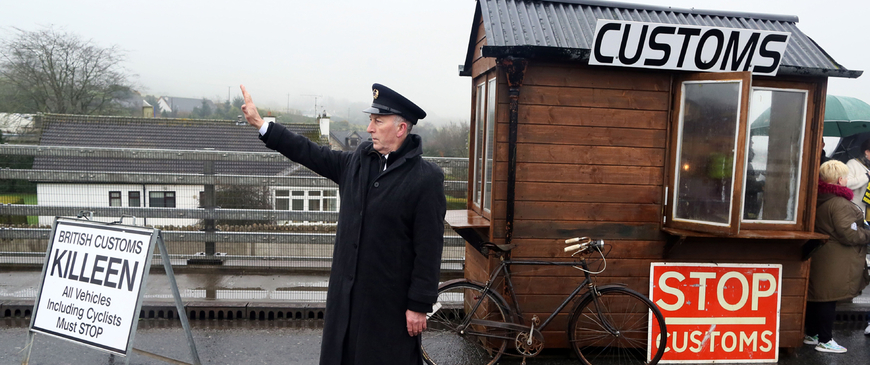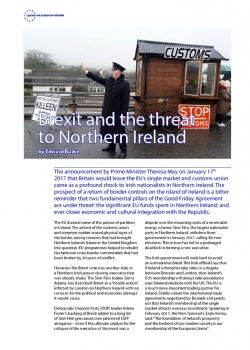
Brexit and the threat to Northern Ireland
A hard Brexit risks many of the gains of twenty years of peace and cross-border co-operation in Northern Ireland. Only a special EU status can stop the rot.
The announcement by Prime Minister Theresa May on January 17th 2017 that Britain would leave the EU’s single market and customs union came as a profound shock to Irish nationalists in Northern Ireland. The prospect of a return of border controls on the island of Ireland is a bitter reminder that two fundamental pillars of the Good Friday Agreement are under threat: the significant EU funds spent in Northern Ireland; and ever closer economic and cultural integration with the Republic.
A return of border controls to #Ireland means that the Good Friday Agreement is under threat.
The EU drained some of the poison of partition in Ireland. The advent of the customs union and common market erased physical signs of the border, easing tensions that had brought Northern Ireland’s future in the United Kingdom into question. EU programmes helped to rebuild ties between cross-border communities that had been broken by 30 years of conflict.
However, the Brexit vote was another hole in a Northern Irish power-sharing executive that was already shaky. The Sinn Féin leader, Gerry Adams, has described Brexit as a “hostile action”, inflicted by London on Northern Ireland with no concern for the political and economic damage it would cause.
Democratic Unionist Party (DUP) leader Arlene Foster’s backing of Brexit added to a long list of Sinn Féin grievances over perceived DUP arrogance – even if the ultimate catalyst for the collapse of the executive at Stormont was a dispute over the mounting costs of a renewable energy scheme. Sinn Féin, the largest nationalist party in Northern Ireland, withdrew from government in January 2017, calling for new elections. This in turn has led to a prolonged deadlock in forming a new executive.
The Irish government will work hard to avoid an acrimonious Brexit. But Irish officials say that if Ireland is forced to take sides in a dispute between Brussels and London, then Ireland’s EU’s membership will always take precedence over bilateral relations with the UK. The EU is a much more important trading partner for Ireland. Dublin values the international trade agreements negotiated by Brussels and points out that Ireland’s membership of the single market attracts overseas investment. Speaking in February 2017, the then Taoiseach, Enda Kenny, said: “The foundation of Ireland’s prosperity and the bedrock of our modern society is our membership of the European Union”.
Theresa May’s failure to secure a majority in the June general election presents the DUP with a rare opportunity of holding meaningful power in Westminster. Some in the DUP, including leader Arlene Foster, are aware of the threat of a hard Brexit to Northern Ireland’s economy. But the DUP is unlikely to use nuanced, persuasive rhetoric to convince the Conservatives to soften Brexit – the DUP is better known for bluntness in stating its undiluted commitment to maximising British sovereignty, and its unwavering patriotism. The DUP will continue to take a back seat in Westminster when it comes to Britain’s Brexit negotiations.
Theresa May’s government will be viewed with increased suspicion by Northern Ireland’s nationalist community as long it is dependent on DUP support. Dublin will also be more circumspect in its relationship with London in future negotiations over Northern Ireland. Before the general election Sinn Féin had criticised British secretary of state for Northern Ireland, James Brokenshire, for being too close to the DUP. It will now be even more difficult for the British government to mediate in political disputes between the two sides.
Between 2014 and 2020 Northern Ireland expected to draw more than €3.5 billion from the EU, including approximately €2.5 billion in Common Agricultural Policy (CAP) payments – larger than any other comparably-sized UK region. More than 8 per cent of Northern Ireland’s GDP is dependent upon EU funded programmes.
#Ireland's EU's membership will always take precedence over bilateral relations with the UK.
After Brexit, EU funds will have to be replaced by funding from London, or a recession in Northern Ireland will be inevitable. The UK government has yet to indicate which EU budget programmes it will replace after 2020 (Chancellor of the Exchequer Phillip Hammond has guaranteed EU levels of funding for one year after 2019, the year Britain will probably leave the EU).
Even with common EU membership, North-South trade in goods is surprisingly low for two small jurisdictions sharing the same island. Around a quarter of the North’s goods exports go to the South, but less than 2 per cent of the Republic of Ireland’s goods exports go to Northern Ireland. An exit from the EU without a free trade agreement between the UK and the EU would further depress cross-border trade in goods, as these would be subject to tariffs.
Policing a customs border will not be easy and will require a significant investment in resources north and south of the border. But the future of the Irish border is not only a trade issue. It is also a big migration, counter-terrorism and serious crime challenge for both countries. Much will depend on the UK’s future relationship with the EU, including whether it continues to access EU Justice and Home Affairs (JHA) agencies and instruments. On a visit to Northern Ireland in May 2017, Theresa May called for “as seamless and frictionless a border as possible”. But the EU’s chief negotiator, Michel Barnier, said in July: “A trading relationship with a country that does not belong to the European Union obviously involves friction.”
Of all the nations and regions of the UK, Northern Ireland has the most compelling case to establish a separate, privileged relationship with the EU in the post-Brexit era. Northern Ireland has already enjoyed a special status in the EU since the 1998 Good Friday Agreement. And EU citizenship will remain an automatic right for many people born in Northern Ireland after Brexit (under the Irish constitution, reaffirmed by the Good Friday Agreement, citizenship extends to anybody born on the island of Ireland as long as one parent is already an Irish citizen).
The DUP will continue to take a back seat in #Westminster when it comes to #Brexit negotiations.
The EU has at least one near-unilateral option available to it – to maintain funding for special peace programmes in Northern Ireland regardless of future UK contributions to the EU budget. Other proposals will be more difficult to implement, such as allowing Northern Ireland continued access to EU structural and investment funds after Brexit.
Both the EU and the UK should come up with a damage limitation plan for Northern Ireland if they fail to agree quickly on a comprehensive trade agreement. One suggestion would be the creation of a specific regime for Irish and Northern Irish goods and services (including and beyond agri-food), essentially exempting them from tariffs and most customs checks if they remain on the island of Ireland. A swiftly negotiated joint EU-UK customs agreement would also ease bureaucratic pressures and costs.
After the collapse of the Northern Irish executive, Belfast lost its voice – a single articulated view of how to mitigate the dangers of Brexit. Meanwhile, post-Brexit relations between Dublin and London are delicately poised. Only a fully engaged British government can successfully diagnose and treat the potentially virulent disease of an Ulster Brexit. So far there are few signs that London is willing to make the difficult compromises required to stabilise its ailing province.
Edward Burke is a lecturer in strategic studies at the University of Portsmouth.

